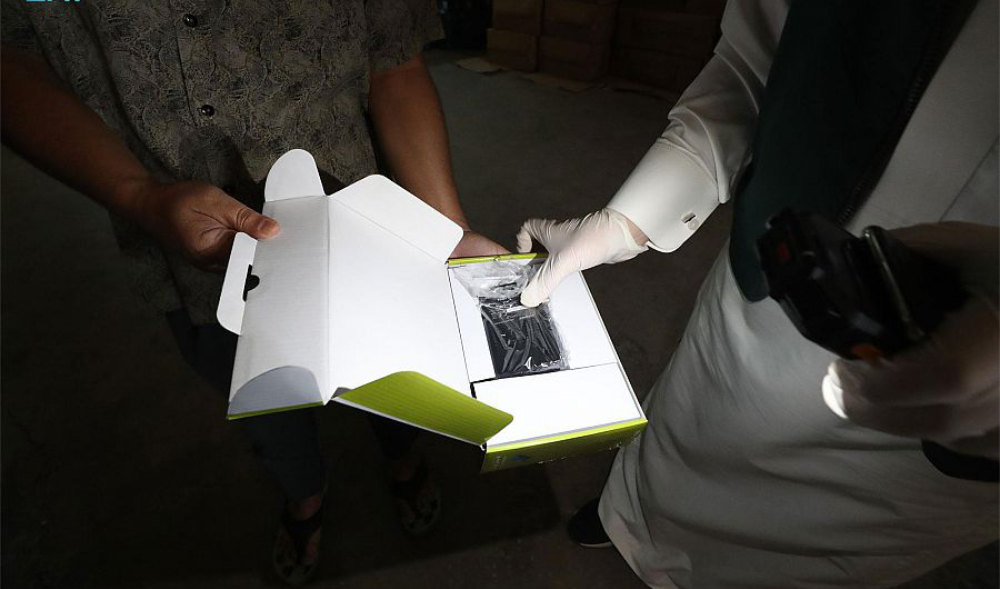JEDDAH: The Ministry of Commerce and Saudi Authority for Intellectual Property are winning the battle against counterfeiting and fraud in the Kingdom, the authority’s spokesman told Arab News.
A recent high-profile case involving a social media influencer, who was caught red-handed by authorities after selling counterfeit goods, demonstrated the need to fight fraud in the Kingdom.
The influencer, who built a large audience of followers on Snapchat, had rented three luxurious furnished apartments in two five-star hotels in northern Riyadh. He began luring women to buy his collection of handbags, shoes, accessories and leather products, which he claimed were from reputed international brands. In a jaw-dropping tactic to further fool his customers, he even used luxury cars to deliver his counterfeit products.
FASTFACTS
• Yasser Hakami, spokesman for the Saudi Authority for Intellectual Property, said that 90 percent of intellectual property violations in 2021 were related to trademarks, with the remaining 10 percent a result of copyright infringements.
• In cooperation with the Zakat, Tax and Customs Authority, more than 2 million counterfeit products were seized and destroyed last year.
However, the fraudster was unaware of the capabilities of the SAIP inspection and follow-up teams. As part of its war on intellectual property law violators, the Saudi Authority for Intellectual Property, in cooperation with the relevant authorities, raided the man’s home and seized 1,242 counterfeit products, with an estimated value of about SR700,000 ($187,000). In a statement, the Ministry of Commerce said that it referred the individual to legal authorities for prosecution.
Yasser Hakami, spokesman for the Saudi Authority for Intellectual Property, said that the authority made 1,912 online inspection visits during 2021. Last year, he added, it conducted 282 visits to promote awareness of intellectual property rights and obligations.
“In 2021, we also recommended 2,079 websites to be blocked for violating the Kingdom’s intellectual property laws. Moreover, the Saudi Intellectual and Property Authority made more than 6,400 field inspection tours in 10 cities. These resulted in the confiscation of more than 95,000 items,” he told Arab News.
Hakami said that 90 percent of intellectual property violations in 2021 were related to trademarks, with the remaining 10 percent a result of copyright infringements.
In cooperation with the Zakat, Tax and Customs Authority, more than 2 million counterfeit products were seized and destroyed last year. The most common items included shoes, clothes, mobile accessories, sanitary ware and car filters, all bearing well-known trademarks from major international companies.
It also confiscated and destroyed more than 5.5 million items that violated the Kingdom’s intellectual property regulations, including pirated DVDs, CDs, books, as well as fake desktops, laptops, hard disks, memory chips, TV satellite boxes and CD-copying devices.
The Ministry of Commerce has repeatedly warned against the selling or marketing of fake or counterfeit goods. The act is considered a violation of the Anti-Commercial Fraud Law and Trademark System. The ministry said that any violation may lead to penalties of up to one year in prison and fines of up to SR1 million ($266,645). Both penalties can be applied in certain cases.
Ahmed Saad Omar, a Makkah-based medicine college student, told Arab News that he “appreciates the efforts of the Commerce Ministry in fighting counterfeiting,” because of the damage that the crime can do to society.
Omar called for stricter intellectual property enforcement to “put an end to these illegal activities and practices in which some consumers can naively lose their money on fake goods and even expose their lives to danger.”
Abdulrahman Al-Amri, a schoolteacher, said that the photos and videos posted by social media influencers should be monitored to protect followers from potential counterfeit products.















